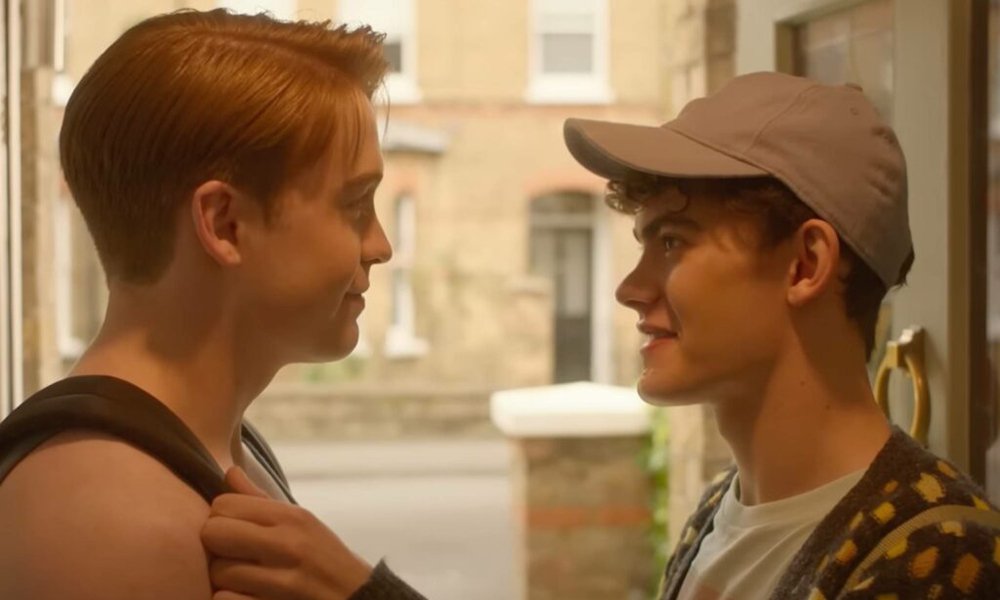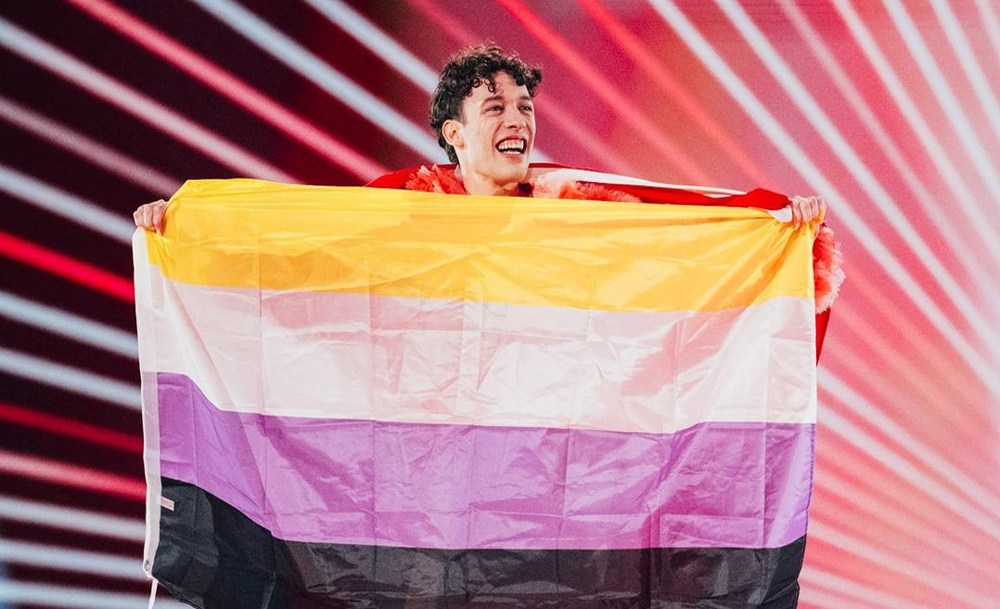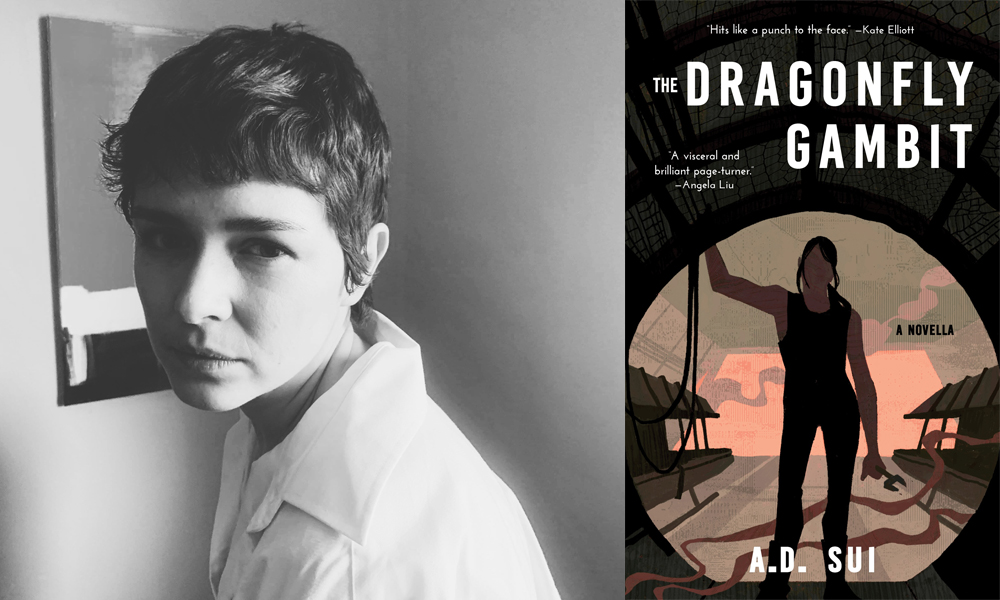IN Magazine talked with the writer/producer/songwriter/actor of I Don’t Know Who You Are to discuss acting in film, the many hats he wears to portray main character Benjamin, and the future of gay rights in Canada…
I Don’t Know Who You Are will have its world premiere this month at the Toronto International Film Festival, and lead actor extraordinaire Mark Clennon is poised to be a big star. Already crowned by TIFF as one of the festival’s Rising Stars, Clennon cut his teeth in acting before embarking on a journey in Toronto to bring his music to the world. Clennon reprises the role of Benjamin in M.H. Murray’s newest feature film, the same role he played in Murray’s 2020 short film, Ghost.
Mark Clennon brings a sense of authenticity to Benjamin’s struggles as the character endures sexual assault on the streets of Toronto. He spends a fateful weekend attempting to raise enough money to afford HIV-preventive PEP medication in order to stave off the virus in the event that his attacker infected him. Transitioning from confidence to a whirlwind of emotions as the film progresses, Clennon is center stage in this epic indie. I was privileged to screen the film before the festival started and discuss Benjamin’s journey with Clennon.
I had a chance to screen the film ahead of time. Gosh, you are so good in it! What drew you to the role of Benjamin and how does it differ from Ghost?
I’m glad that you liked it. Honestly, a huge part of it was M.H. because I’ve known M.H. for a long time. We’ve been friends just kind of around the Toronto scene. He kept on saying “You should, you’re so great, you should be an actor, you should get back into acting.” I was like, “I don’t know, I’m a musician and I’m focusing on music.” But he was really persistent. So we decided to do Ghost as just like testing the waters to see how that would go and it ended up being such an amazing experience. It kind of opened up my acting mind again, because I used to be an actor a very long time ago. I quit acting to focus on music because I just wanted to give music a chance and I got a record deal. I started making music and that took me in another direction. M.H. was very instrumental in reintroducing me to acting and I had a really good time with Ghost. Then the reception to Ghost was very powerful. So many people in the industry and just friends and fans were very complimentary of the performance and the character. We thought this would be a really cool thing to expand upon. We spent a lot of time just talking about where we would take Benjamin, what would be the next step in his evolution, what would be his next big picture journey, and then here we are.

What kind of acting did you do prior to this?
When I first came to Toronto, I had an agent and I did a lot of musical theater, and I did a lot of commercials. I did a few short films back then. But I realized after a while that I was gravitating more towards the music side of acting. I had a period where I was doing musical after musical after musical and I realized that I really love acting, but there was something within music that was drawing me to musicals.
For those that haven’t gotten the chance to see I Don’t Know Who You Are, Benjamin becomes a victim of sexual assault and is forced to find a way to pay for life saving HIV-preventative medication as a result. Do you think that this film serves as a commentary on government assisted healthcare and how it might discriminate against the gay community?
Absolutely. This film was such an illuminating experience for me because I had been very aware of a lot of the themes in the movie and the drugs being a gay man myself. I definitely had a familiarity with these experiences, but filming and researching the movie and helping to create the script really enlightened me to just how challenging this specific situation is, especially for people who are in a time of crisis. It’s so troublesome to me to have that happen in a city like Toronto where we do have the resources available. I come from Jamaica, which is a poor country. There’s a lot of conversation about why we don’t have access to certain things whereas, in Canada, we definitely have the means to do this but I don’t think that it’s a priority for people because this story isn’t real to them. I’m hoping that by seeing this film, [audiences] get an intimate understanding of how the healthcare system fails this specific type of person. Hopefully that could help enlighten people about some of the shortcomings of our healthcare system and hopefully lead to a conversation.
I had to write this down because I was so impressed with how many hats you wear in this film. You helped to work on the script. You produce the film alongside the director M.H. You wrote the songs presented in the movie, and you’re pretty much in every single frame for 1 hour and 43 minutes. Do you see a bit of yourself in Benjamin because this really does seem like a very personal project for you.
Yeah, that’s a really good question. It’s absolutely true. This is my first feature film and it is beyond a feature film. To me, this has been the entirety of my life for a very long time. I feel very blessed to be a part of it. I feel very blessed to be able to impart my specific experience to this character. There’s so many things that we have in common: we’re gay men that live in Toronto, we’re from a Jamaican background, we have different experiences in one regard but very similar experiences in another regard. So I definitely feel a very strong connection to Benjamin and I think that’s what made me so motivated to be as involved as I was able to in this process, because I wanted to. I felt like it was our responsibility to tell this person’s story. It’s not my story, but it is a story very similar to my own story.
In the beginning of the movie, Benjamin seems to be very relaxed. He’s confident and excited for his date with Malcolm, the new guy that he’s seeing. After this traumatic experience, his vulnerability shines through. How did you and the director work together on developing Benjamin’s behaviors and the progression throughout the film? Were scenes filmed in order?
The scenes were actually not filmed in order, but because there were so many logistical challenges that we had to face in getting everything shot in a timely manner. There’s certain locations that were available on certain days and there were certain actors, so we definitely had to create a schedule that was logistically convenient as opposed to filming it chronologically, which would have been great. It was filmed very randomly. I feel very grateful to have been a part of that process because it was definitely challenging at times, and there were many parts of it that were tough.

One of the things that’s somewhat frustrating in the film was that Benjamin doesn’t contact the police. He just wants to move on and proceed as normal. He wants raise the money that he can within that weekend. Was that a specific choice that everybody involved in the film made to not make vengeance a theme? It does come up a little bit in surprising ways, which was kind of amazing.
From the initial scripts, we had made a few adjustments to sort of address that specific point. One of the things that we centered on was the idea that this is a person from a community that is very conservative. He’s Jamaican, and Jamaican culture is very conservative. In cases of sexual assaults, the reaction isn’t always what would happen here. I feel like if these scenarios happen to someone else, there would be an insight and a process to it. Whereas one of the main things that Benjamin really wrestled with was guilt, and his own stigma about why this happened to him. That’s something that we thought about very much considering that he is from a Jamaican background and in our culture, when these things happen, the instinct is to keep it to yourself. If you don’t, then assumptions have been made about, “Why did you go there? What were you wearing?” Those are the kinds of conversations that people have. So we thought about that. M.H. and I were saying the other day that the movie would have gone a lot differently if [Benjamin] had made all the right decisions. There is no right or wrong decision, but when that happens to you, there’s generally a process that you take and you go through. Whereas I think he was wrestling with so much inner turmoil. Turmoil that he made a lot of wrong decisions, including not going to the police and also not leaning more on his friends. You realize in the end when he spoke to Malcolm and he spoke to other friends, he was able to get a lot of emotional and financial support. I think part of what makes this film so beautiful is that Benjamin is a very smart, brilliant guy, but he’s also someone who doesn’t always make the right decisions. But that’s why it’s frustrating as a viewer to watch. It’s also what makes it so real.
Speaking of the ending, I’m glad that the support system finally came to Benjamin in ways that he could accept it. Not to go into a lot of details about how the film ends, but was the ending something that was completely planned ahead of time or was there room for improvising new ideas along the way?
The main thing that we wanted to do was to have a hopeful ending and to make sure that the film ended in a positive manner showing the beautiful parts of his life. When M.H. had originally written the script, that was basically there. Then we adjusted certain parts of it. The main thing was I wanted it to end in a way that would leave Malcolm and Benjamin in a good place together, but also leave everyone in his world just in a good place. We kind of always knew that it was going to end in a positive way. But as the script’s writing evolved, how that happened changed. It was very important for M.H. to incorporate Malcolm’s story about his experience with HIV. We wanted to present it in a way that was positive because normally when you hear about a character having HIV in a film, it’s usually very tragic. However, we tried very hard to make sure that when Malcolm told Benjamin, it was used as a tool of empowerment. It’s a heavy film, and it’s a lot of really intense themes. But a lot of the feedback that we’ve gotten [has been] positive, that it ends on a good note, which I feel good about.
Congrats on being named one of TIFF’s Rising Stars! What does that kind of recognition mean for you, especially Toronto-based and a newish actor?
It feels really good because I’ve always felt like an outsider as an artist. I’ve been making art my whole life, but it’s never been easy. I love it. It’s what I’ve felt like I was meant to do but it hasn’t been the most welcoming journey. There’s a lot of adversity that artists face, a lot of rejection, especially in music and acting where your entire work is built around auditioning or getting rejected and then creating art and then having it be critiqued. There’s just so much of that, that has always made me feel very, very grateful to get to do what I do, but I’ve never felt like I was doing well or with the cool kids so to speak. So I think this definitely was a really good stamp of approval for my confidence and for my self-esteem to move forward feeling a bit of validation from my parents and from TIFF as far as acting goes. I’m so excited to see where the next chapter of my life goes as an actor. I’m very excited to also see what opportunities will come in the next few weeks and months, hopefully.
Congratulations again and good luck at TIFF!
Thank you!
RELATED:






POST A COMMENT